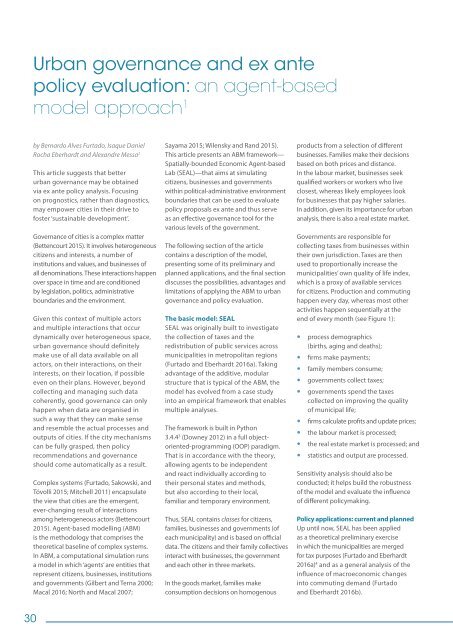A new urban paradigm pathways to sustainable development
PiF37
PiF37
Create successful ePaper yourself
Turn your PDF publications into a flip-book with our unique Google optimized e-Paper software.
Urban governance and ex ante<br />
policy evaluation: an agent-based<br />
model approach 1<br />
by Bernardo Alves Furtado, Isaque Daniel<br />
Rocha Eberhardt and Alexandre Messa 2<br />
This article suggests that better<br />
<strong>urban</strong> governance may be obtained<br />
via ex ante policy analysis. Focusing<br />
on prognostics, rather than diagnostics,<br />
may empower cities in their drive <strong>to</strong><br />
foster ‘<strong>sustainable</strong> <strong>development</strong>’.<br />
Governance of cities is a complex matter<br />
(Bettencourt 2015). It involves heterogeneous<br />
citizens and interests, a number of<br />
institutions and values, and businesses of<br />
all denominations. These interactions happen<br />
over space in time and are conditioned<br />
by legislation, politics, administrative<br />
boundaries and the environment.<br />
Given this context of multiple ac<strong>to</strong>rs<br />
and multiple interactions that occur<br />
dynamically over heterogeneous space,<br />
<strong>urban</strong> governance should definitely<br />
make use of all data available on all<br />
ac<strong>to</strong>rs, on their interactions, on their<br />
interests, on their location, if possible<br />
even on their plans. However, beyond<br />
collecting and managing such data<br />
coherently, good governance can only<br />
happen when data are organised in<br />
such a way that they can make sense<br />
and resemble the actual processes and<br />
outputs of cities. If the city mechanisms<br />
can be fully grasped, then policy<br />
recommendations and governance<br />
should come au<strong>to</strong>matically as a result.<br />
Complex systems (Furtado, Sakowski, and<br />
Tóvolli 2015; Mitchell 2011) encapsulate<br />
the view that cities are the emergent,<br />
ever-changing result of interactions<br />
among heterogeneous ac<strong>to</strong>rs (Bettencourt<br />
2015). Agent-based modelling (ABM)<br />
is the methodology that comprises the<br />
theoretical baseline of complex systems.<br />
In ABM, a computational simulation runs<br />
a model in which ‘agents’ are entities that<br />
represent citizens, businesses, institutions<br />
and governments (Gilbert and Terna 2000;<br />
Macal 2016; North and Macal 2007;<br />
Sayama 2015; Wilensky and Rand 2015).<br />
This article presents an ABM framework—<br />
Spatially-bounded Economic Agent-based<br />
Lab (SEAL)—that aims at simulating<br />
citizens, businesses and governments<br />
within political-administrative environment<br />
boundaries that can be used <strong>to</strong> evaluate<br />
policy proposals ex ante and thus serve<br />
as an effective governance <strong>to</strong>ol for the<br />
various levels of the government.<br />
The following section of the article<br />
contains a description of the model,<br />
presenting some of its preliminary and<br />
planned applications, and the final section<br />
discusses the possibilities, advantages and<br />
limitations of applying the ABM <strong>to</strong> <strong>urban</strong><br />
governance and policy evaluation.<br />
The basic model: SEAL<br />
SEAL was originally built <strong>to</strong> investigate<br />
the collection of taxes and the<br />
redistribution of public services across<br />
municipalities in metropolitan regions<br />
(Furtado and Eberhardt 2016a). Taking<br />
advantage of the additive, modular<br />
structure that is typical of the ABM, the<br />
model has evolved from a case study<br />
in<strong>to</strong> an empirical framework that enables<br />
multiple analyses.<br />
The framework is built in Python<br />
3.4.4 3 (Downey 2012) in a full objec<strong>to</strong>riented-programming<br />
(OOP) <strong>paradigm</strong>.<br />
That is in accordance with the theory,<br />
allowing agents <strong>to</strong> be independent<br />
and react individually according <strong>to</strong><br />
their personal states and methods,<br />
but also according <strong>to</strong> their local,<br />
familiar and temporary environment.<br />
Thus, SEAL contains classes for citizens,<br />
families, businesses and governments (of<br />
each municipality) and is based on official<br />
data. The citizens and their family collectives<br />
interact with businesses, the government<br />
and each other in three markets.<br />
In the goods market, families make<br />
consumption decisions on homogenous<br />
products from a selection of different<br />
businesses. Families make their decisions<br />
based on both prices and distance.<br />
In the labour market, businesses seek<br />
qualified workers or workers who live<br />
closest, whereas likely employees look<br />
for businesses that pay higher salaries.<br />
In addition, given its importance for <strong>urban</strong><br />
analysis, there is also a real estate market.<br />
Governments are responsible for<br />
collecting taxes from businesses within<br />
their own jurisdiction. Taxes are then<br />
used <strong>to</strong> proportionally increase the<br />
municipalities’ own quality of life index,<br />
which is a proxy of available services<br />
for citizens. Production and commuting<br />
happen every day, whereas most other<br />
activities happen sequentially at the<br />
end of every month (see Figure 1):<br />
• y process demographics<br />
(births, aging and deaths);<br />
• y firms make payments;<br />
• y family members consume;<br />
• y governments collect taxes;<br />
• y governments spend the taxes<br />
collected on improving the quality<br />
of municipal life;<br />
• y firms calculate profits and update prices;<br />
• y the labour market is processed;<br />
• y the real estate market is processed; and<br />
• y statistics and output are processed.<br />
Sensitivity analysis should also be<br />
conducted; it helps build the robustness<br />
of the model and evaluate the influence<br />
of different policymaking.<br />
Policy applications: current and planned<br />
Up until now, SEAL has been applied<br />
as a theoretical preliminary exercise<br />
in which the municipalities are merged<br />
for tax purposes (Furtado and Eberhardt<br />
2016a) 4 and as a general analysis of the<br />
influence of macroeconomic changes<br />
in<strong>to</strong> commuting demand (Furtado<br />
and Eberhardt 2016b).<br />
30


